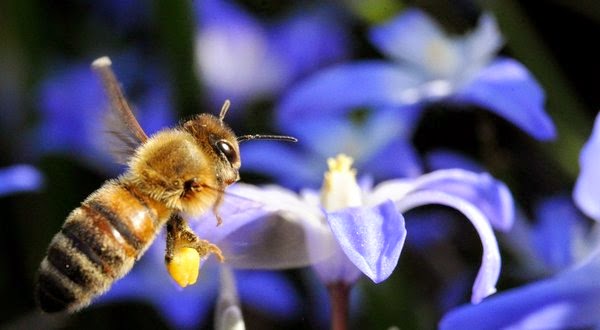Pesticides Are Killing The Global Bee Population (VIDEO)
by Arjun Walia
It’s been pretty big news for quite a few years now, the honeybee population has been dying off in very large numbers. At first the cause wasn’t so clear as it could have been for a number of reasons from environmental toxins to environmental changes. But evidence that has been coming forward over the past couple of years has made it clear what the problem is.
Pesticides. A large body of evidence, outlined below, illustrates the clear link between pesticide use and the decline in honeybees around the globe.
The video below was made as part of Greenpeace UK’s campaign to protect honeybees from the negative effects of pesticides.
Widget not in any sidebars
The video is a response to the millions and millions of bees that are dying all over the world. Not only are pesticides extremely toxic and detrimental to human health, (you can read more about that here and here) they are also responsible for the massive decline in global honey bee population.
The Research
A new study out of Harvard University, published in the June edition of the Bulletin of Insectology determined that neonicotinoids are killing bees at an exponential rate, they are the direct cause of the phenomenon labeled as colony collapse disorder (CCD). Neonicotinoid’s are the world’s most widely used insecticides.(1)
A paper published in the journal Nature discusses how bees are twice as likely to die when exposed to pesticides; two-thirds of the bees are lost when exposed compared to a third when not exposed. The exposed bees are also half as successful in gathering food.(2)
Scientists from the US Department of Agriculture as well as the University of Maryland published a study that linked chemicals, including fungicides, to the large-scale die-off of bees that has recently plagued the planet. (3)
In the United Stats alone, the honeybee population declined by approximately 30 percent, with some beekeepers reporting losses up to 90 and 100 percent. More than 100 US crops rely on honeybees to pollinate them. The study determined that fields ranging from Maine to Delaware contained nine different agricultural chemicals. These included fungicides, herbicides, and insecticides. In some cases they even recorded samples of 21 different agricultural chemicals.
 The largest honeybee loss in the UK was recorded last year, you can read more about that here. The list goes on and on and is pretty overwhelming. There is a lot more information than what is presented in this article, if you’re interested in learning more we encourage you to do your research. Hopefully this is a good starting point for the skeptics who doubt pesticides are responsible for the massive decline in global bee population.
The largest honeybee loss in the UK was recorded last year, you can read more about that here. The list goes on and on and is pretty overwhelming. There is a lot more information than what is presented in this article, if you’re interested in learning more we encourage you to do your research. Hopefully this is a good starting point for the skeptics who doubt pesticides are responsible for the massive decline in global bee population.
Solution? Stop spraying. These chemicals aren’t needed, In 2008, the UN Conference of Trade and development supported organics, saying that organic agriculture can be more conducive to food security in Africa than most conventional production systems, and is more likely to be sustainable in the long term. You can read that full report HERE.
In truth, we can feed the entire planet organically, we are merely convinced that these pesticides are a necessity. Meanwhile these corporations continue to rake in big bucks at the expense of human health, insect health, animal health and the environment. There are better ways.
Food forests or forest gardening could be a viable alternative. They have been around for a long time with many of the native cultures practicing this form of sustainable agriculture. It is a form of low-maintenance plant-based food production which replicates natural ecosystems, incorporating fruit and nut trees, shrubs, herbs, running vines and perennial vegetables. Beneficial plants and companion planting is a big part of the food forest system.
Unlike much of the modern industrial agricultural system which relies heavily on inputs such as fossil fuels and artificial herbicides, pesticides and fertilizers, a food forest, once established is self-regulating and highly abundant in yield. To read more about that click HERE
There are so many solutions. If the global elite pooled their resources, and gave up a percent of their billions and trillions of dollars to implement large scale sustainable agriculture, it would be easy. We know how to do it. The solutions really are endless…
For more CE articles on the bee decline, please click HERE.
Sources:
- http://sos-bees.org/
- (1) http://www.bulletinofinsectology.org/pdfarticles/vol67-2014-125-130lu.pdf
- (2) http://www.ncbi.nlm.nih.gov/pmc/articles/PMC3250423/?tool=pubmed
- (3) http://www.plosone.org/article/info%3Adoi%2F10.1371%2Fjournal.pone.0070182#authcontrib
Arjun Walia writes for Collective Evolution, where this article first appeared.




